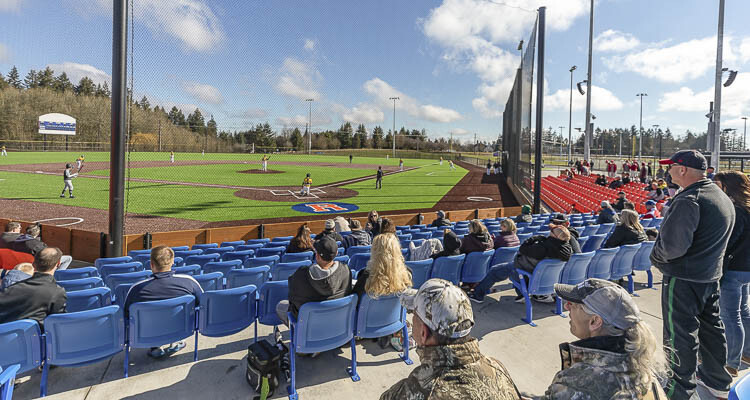
Ridgefield resident Heidi Pozzo discusses the agreements between the city of Ridgefield and the Ridgefield School District to support civic life for area citizens
Heidi Pozzo
for Clark County Today
Who pays for it? As part of the 2017 bond, Ridgefield School District began taking on a number of programs that support civic life. Important programs that every community should have. A place for people to meet. Community education. Sports. Youth programming. People love them. They build community and facilitate neighbors getting to know one another.

But these aspects of civic life are typically in the domain of cities. It is part of their core function and part of how they plan and design flourishing communities. And their tax structures are designed to pay for them. Schools don’t have jurisdiction to raise taxes other than through a vote of the people for bonds and levies, with limitations on the amount that can be levied. But cities can adjust taxes through a variety of fees and taxes.
Who does what matters.
With the 2017 bond, the district provided the land for the Ridgefield Outdoor Recreation Complex (RORC). It also took responsibility for everything from scheduling to maintenance to management and administration. And the district pays 40 percent of costs after netting out any revenues. The city doesn’t pay any rent and the school gets priority use.
The district manages youth sports and community education programming. It provides the facilities, scheduling and personnel to do so. These are functions typically handled by cities and leagues. In fact, if you live in unincorporated Clark County, you are paying a tax for county parks. Many of those parks have the types of facilities the district is building.
At the Ridgefield Administrative and Civic Center (RACC), a school was converted to an administrative and civic center. Of the nearly $9 million spent to renovate, the city agreed to pay $2.4 million. $750,000 at the time and the balance over 15 years. There is no rent beyond that, but the city pays 36 percent of maintenance and custodial costs. The community has access to meeting rooms, recreation at the gym, and an early learning center.
At the new K-4 school, a synthetic turf, full sized lighted soccer field is included in the design. As is a middle school sized gym to support youth sports leagues. Along with more parking. These upgrades add more cost to construct and maintain than would otherwise be necessary.
These and other amenities provided by the district are enjoyed by many. But that’s not typically what schools do. The purpose of schools is to educate kids.
There’s another challenge that creeps into the mix. When youth sports are short for space, it is the community programs that are impacted, not school teams. This issue has parents mad at the district for a program that the city should be responsible for funding and operating.
There’s a lot of development going on in the city of Ridgefield. Development by the Port along the waterfront, downtown and along I-5. Clark College is building a facility. At some point PeaceHealth will build a hospital. These are all fantastic developments. And none of them provide any property taxes. Warehouse stores are also great for the community. But their property taxes are relatively low as well.
Much of this development will generate economic activity and taxes for the city. And yet, schools rely on property taxes and state funding to pay their way. With growing cost for civic life, cost pressure increases on education becomes greater. Just this school year, the district budgeted a deficit of $3 million.
Should the city and the district think it makes sense for the district to continue building out facilities and amenities meant for the community, it should pay for the capital and operating cost, including extra land. Further, the placement of those amenities should not preclude future school expansion as we have seen at View Ridge/Sunset Ridge.
That’s why who does what matters. The city should be managing and paying for the civic activities that the district has taken on. The district should return its funding and focus to its core mission. Educating kids.
Heidi Pozzo has been a Ridgefield resident for 16 years. She is a concerned citizen who would like students to get a good education and thinks we can do it in a more cost-effective way.
Also read:
- Opinion: In-n-Out Burger is so much more than fast food for so many of usPaul Valencia shares why In-n-Out Burger means more than just fast food for countless fans as Ridgefield nears its grand opening and Vancouver’s location begins construction.
- Opinion: Washington’s June 2025 budget revisions – revenue up spending up moreMark Harmsworth of the Washington Policy Center critiques the state’s latest budget revisions, warning that new taxes—not organic growth—are driving revenue. He calls for fiscal restraint and long-term reform.
- Opinion: Pedestrian control signalsDoug Dahl explains Washington state law regarding crosswalks and pedestrian signals, offering safety insights and common misunderstandings about traffic control at intersection
- Letter: ‘How can five part-time legislators without research support or reliable access to information serve as an effective check on six full-time elected executives’Bob Zak expresses agreement with recent opinions on the Clark County Charter’s imbalance and endorses John Ley’s transit preference while questioning light rail costs and Council effectiveness.
- POLL: Should the Clark County Clerk remain an elected position?Following public opposition, Clark County Council dropped a proposal to make the clerk an appointed role. Readers can now weigh in through this week’s poll on whether the clerk should remain elected.










